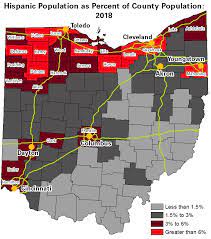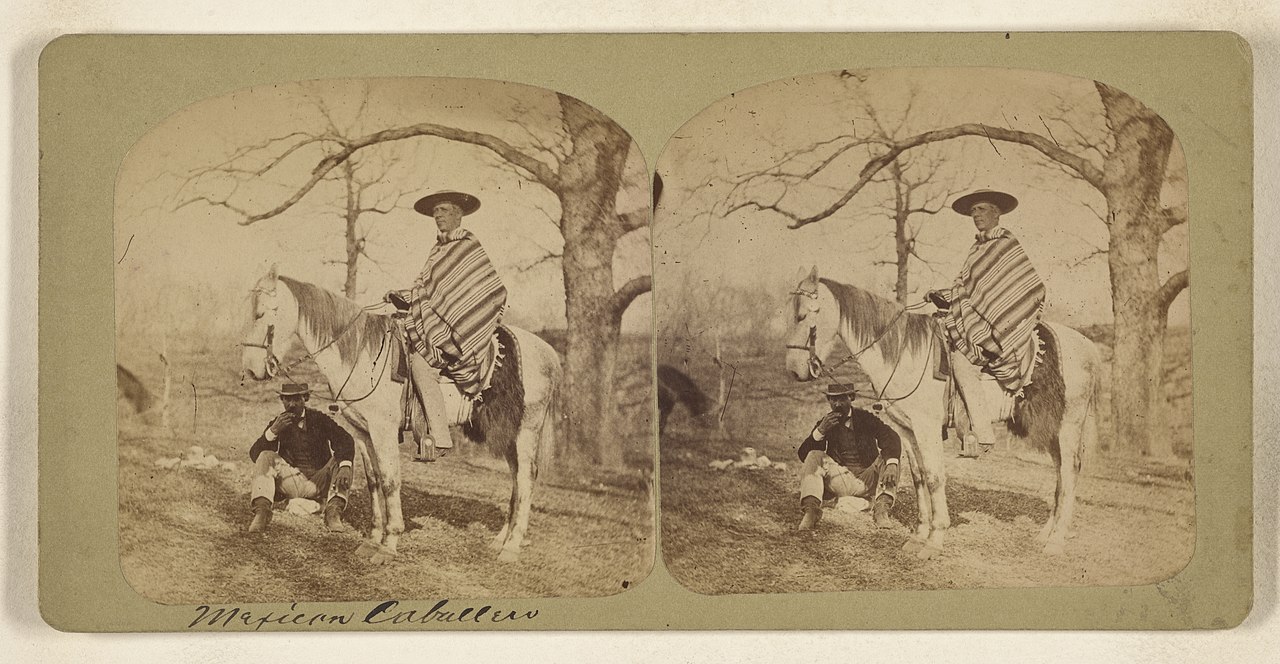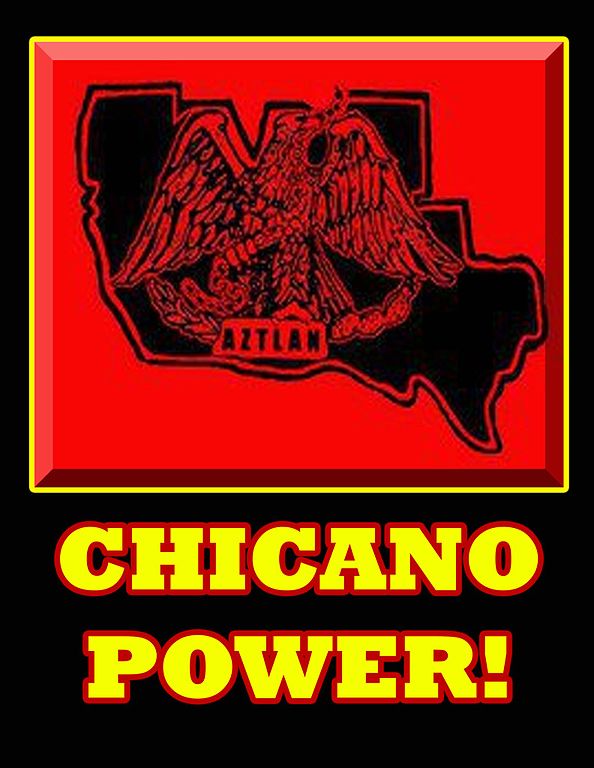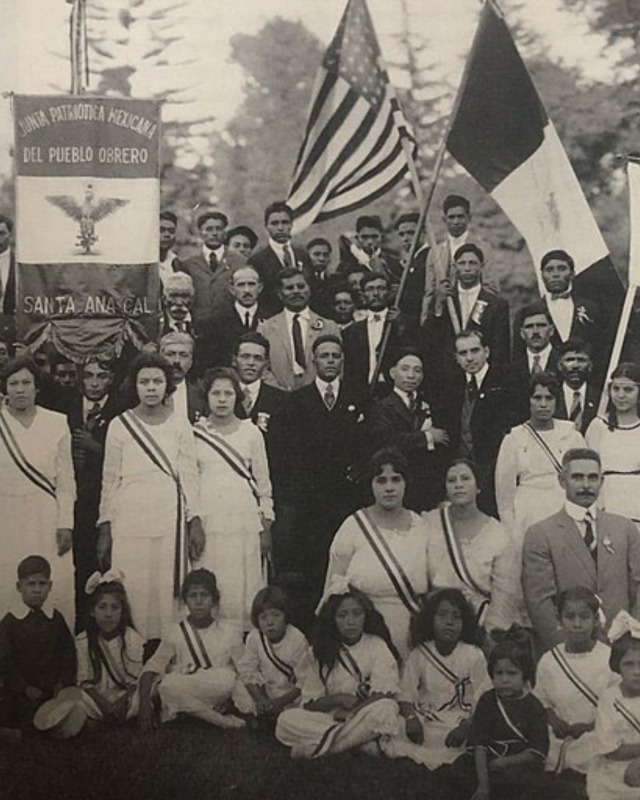History 101-05 Adding Immigrants: Quantitative Methods for Latino Histories
This course examines the history of Latinx immigration to the U.S., considering both federal efforts to shape immigration policy to serve national elites AND the lived experiences of immigrants. We’ll analyze U.S. immigration from the late 19th century to the present, providing a complex historical framework for contemporary immigration debates. We will consider how and why federal immigration records are constructed and maintained; the role of quantitative arguments in formulating racially motivated immigration quotas; what quantitative records can and cannot tell us about immigrant communities; and how statistics have been selectively applied in debates about what it means to be “American.”
Students will learn how to apply quantitative historical techniques through intensive use of digitized immigration records including the U.S. Alien Registration Forms (1940-1946) and the U.S. Census Bureau to learn how to create a data set, calculate descriptive statistics, graph and make sense of data using Excel, and interpret secondary literature based on quantitative evidence.
This course satisfies the quantitative literacy (QL) and D (Diversity, Power, & Privilege) requirement for graduation.
Spring 2023
M/W/F 9:00-9:50 Kauke 039
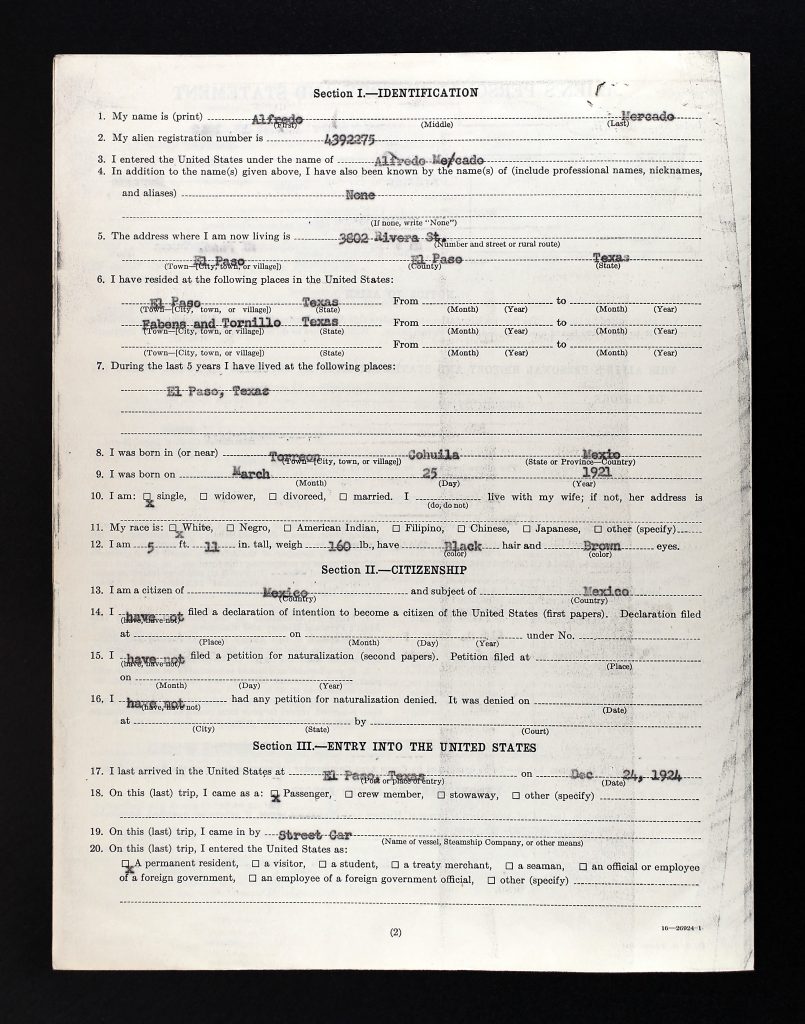
email me
Book Me
Schedule
Spring 2023 Office Hours
Tuesday 10-11am, Wednesday 10am-11am, Friday 1-2pm, or by appointment
Class Information
Overview
What will I learn?
By the end of this course, you’ll be able to:
- Identify the principal events, legislation, and institutions that shaped Latino immigration history and explain their significance.
- Locate and critically evaluate quantitative and qualitative sources about immigration history, including the limitations of different sources of information. (Graduate Quality: Integrative Inquiry)
- Explain how and why government sources for immigration history are created, organized, and maintained, and how institutional repositories shape the information available to historians.
- Apply quantitative historical techniques including the creation of a dataset, the calculation of descriptive statistics, and the design of effective data visualizations. (Graduate Quality: Dynamic Understanding of the Liberal Arts)
- Draw on specific examples from U.S. immigration history to explain the ways in which power and privilege shape social situations, structures, and institutions. (Graduate Quality: Justice & Social Responsibility)
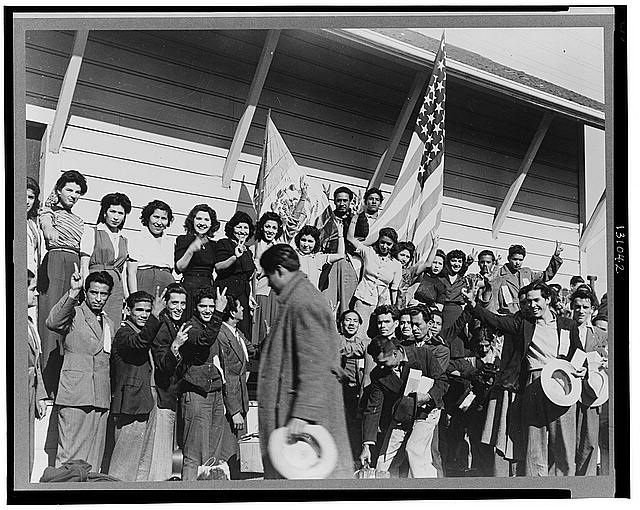
Materials
We’ll be reading sections from five books, all of which are available as ebooks from the College of Wooster library or online as open source publications:
- Jorge Camões. Data at Work: Creating Effective Charts and Information Graphics in Microsoft Excel. New Riders, 2016.
- Louis Gerard Mendoza. Conversations across Our America: Talking about Immigration and the Latinoization of the United States. Austin: U of Texas P, 2012.
- Mae Ngai. Impossible Subjects: Illegal Aliens and the Making of Modern America. Princeton: Princeton UP, 2005.
- Online Statistics Education: An Interactive Multimedia Course of Study. Open-source online textbook developed at Rice University.
- Alejandro Portes and Rubén Rumbaut. Immigrant America: A Portrait. Berkeley: U California P, 2014.
Excel Support
You will need to install the latest desktop version of Excel on your computer: this is free for current CoW students.
- Basic Tasks in Excel
- Prof. Miriam Posner “How to Make a Pivot Table in Excel“
- Kevin Stratvert “Pivot Tables in Excel“
- Microsoft Tutorial “Create a Chart“
- Jorge Camões “Creating Visualizations with Excel“
- Policy Viz Tutorials
- Lemercier “Things You Should Learn to Do with a Spreadsheet Editor”
Finding Data
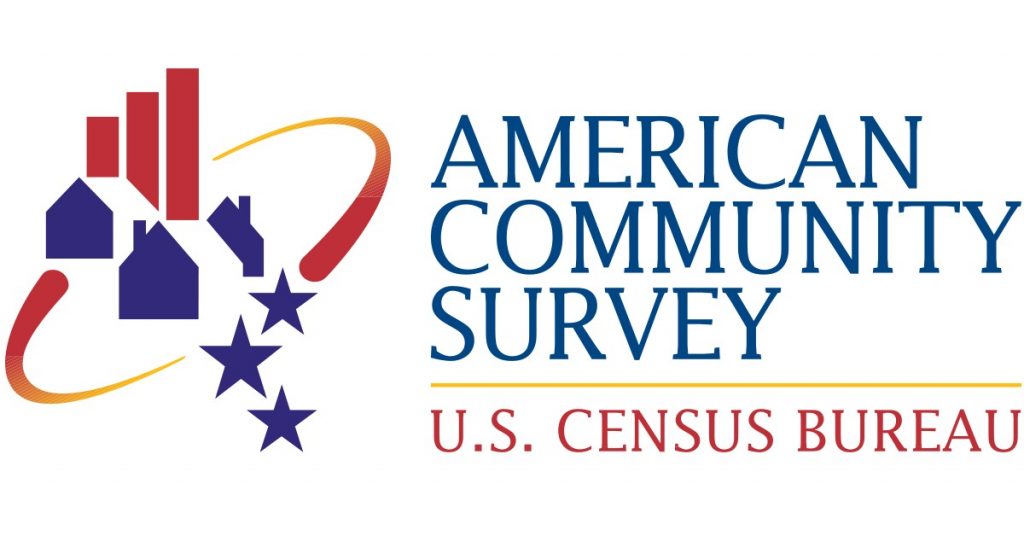
Garbage in = garbage out! Here are some places to find high-quality data for class projects.
Grading
| Assignment | Points |
| Homework Sets | 225 |
| Participation & Professionalism | 100 |
| Immigration Media Analysis | 50 |
| El Paso Data Visualizations | 50 |
| Wikipedia Project | 75 |
| Research: Prospectus | 100 |
| Research: 2 Data Visualizations | 100 |
| Research Presentation (Pecha Kucha) | 100 |
| 2 Unit Quizzes | 40+60 |
| Final Exam | 100 |
| Total | 1000 |
A = 930+ A-= 900 to 929
B+= 870 to 899 B=830 to 869 B-=800 to 829
C+=770 to 779 C=730 to 769 C-=700 to 729
D=600 to 699
F=599 or below
Our Moodle gradebook gives you the ability to check your course standing at any time.
Late Work
Tokens
Each student gets three (3) tokens to start the semester. You are free to exchange your tokens for:
- an opportunity to revise and re-submit a graded assignment. You have up to 1 week from the date I give you my feedback to revise and resubmit.
- to get a 48-hour extension on a forum post, most homework assignments, your Wikipedia assignment, Immigration Media project, or prospectus.
Because of the time-sensitive nature of other assignments, you can’t use tokens to get “no questions asked” extensions on homework assignments involving in-class activities or peer review, creation of your entries for our Alien Registration Card database, your final data visualizations or research presentation, Unit Quizzes, or the Exam.
You can also earn “Bonus Tokens” by attending events related to course themes.
Report your Token use BEFORE the assignment is due.
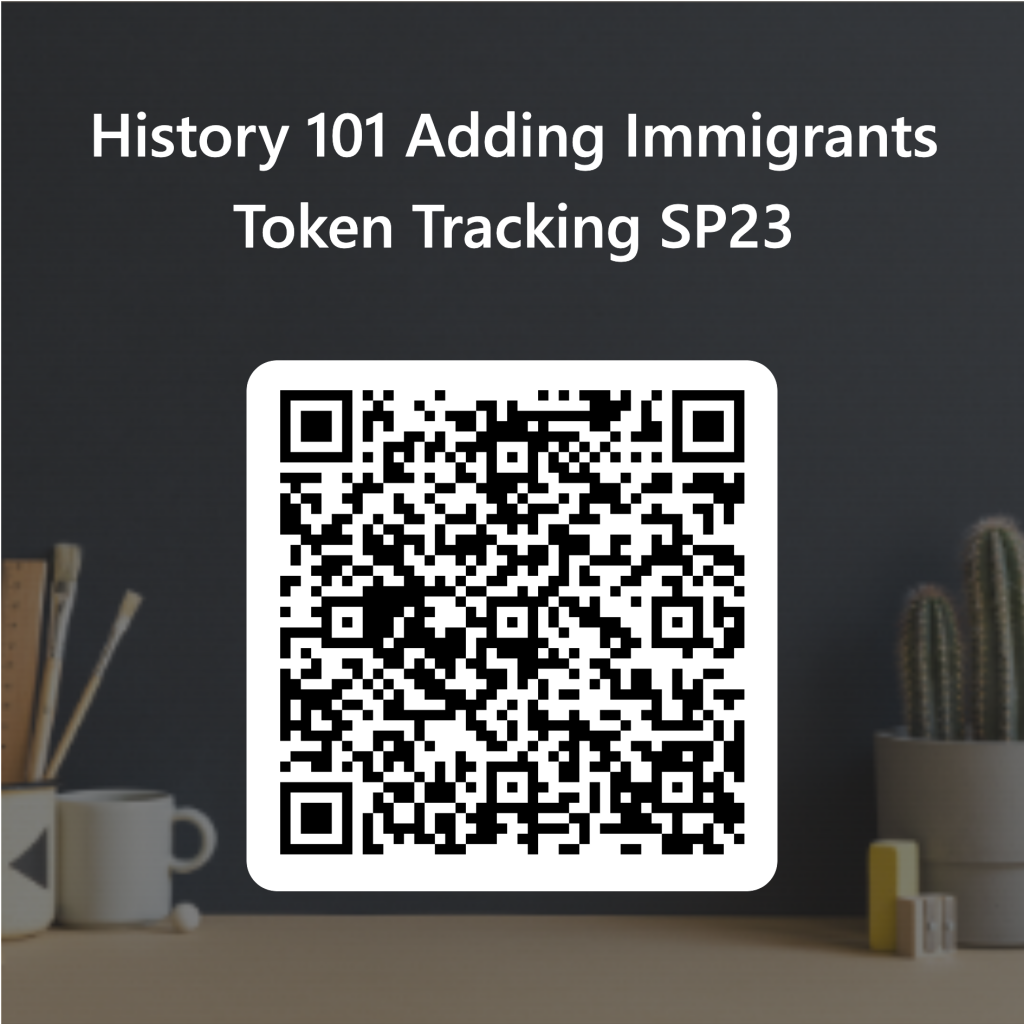
Assignments
Homework
News Critique
Participation
Wikipedia
Dataset
Quizzes + Exam
Research
Presentation
Tips
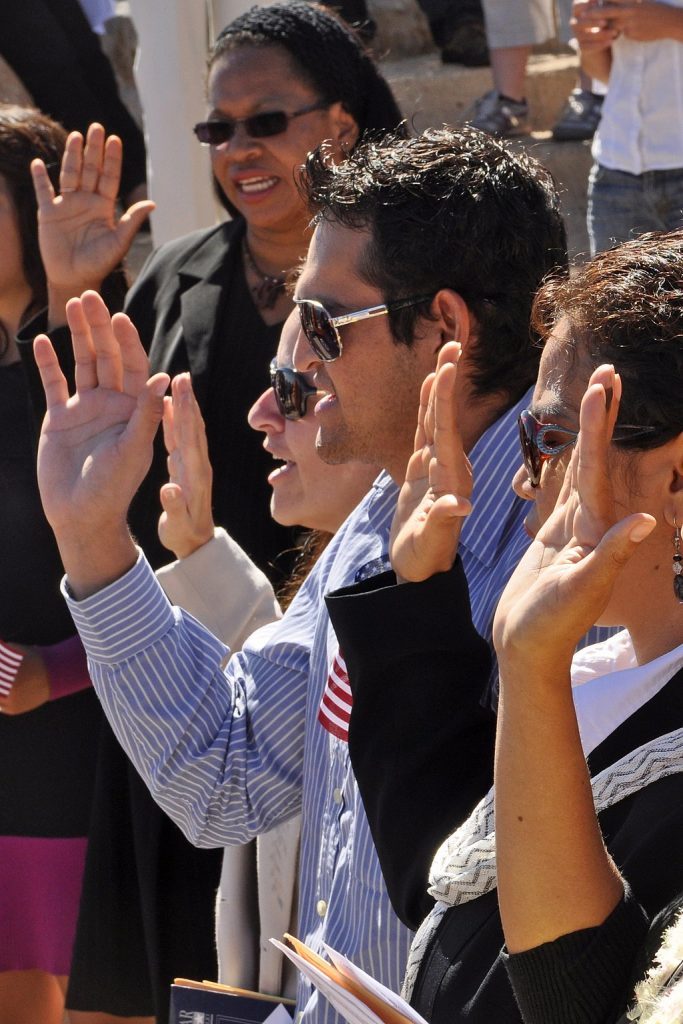
How to prepare
Reading before Class: Read actively and attentively. Pay careful attention to the text. Underline passages of interest, write keywords and questions in the margins, look up words you don’t know. Bring your notes, responses to reading questions, texts, and questions to seminar. These will be the basis of much of our in-class discussions and out-of-class assignments. Bring a curious mind to the materials.
Participating in Class: Hearing from our entire class will enrich our shared experience by bringing in a diversity of perspectives. Come to class prepared with your readings, notes, and observations to contribute to our learning. Don’t be afraid of getting something wrong in discussion. Everyone will, and we’ll learn together. Bring a notebook, and take notes on our class discussion.
Approaching our Course Work: Each unit of the class builds on the last. Students need to be willing to try new things, exploring different ways of communicating and the use of new technologies. This requires creativity, but also a commitment to do the work to learn new tools, keeping up with the scaffolding to build skills over the course of the semester. While this scaffolding will help you learn new things, it does mean that it can be hard to do well on later assignments if you are missing earlier skills. You need to be willing to share work in progress and get constructive feedback to revise and improve your final product. Schedule your time carefully, and come see me early if you need help.
Communication & Campus Connections: Meet with your professors frequently. Take advantage of support services offered by APEX, the Learning Center, and the Writing Center. We’re here to help you succeed. Let me know if you have questions, concerns, or if there is anything I can do to support your learning.
Classroom Atmosphere & Expectations
The content of this course is not simply the readings, homework, and projects. It is what takes place in the classroom in our learning community. Your active participation is very important. We will be devoting. many class sessions to hands-on historical workshops and discussion.
Our classroom has to be a space where everyone can learn. Our analysis of structural inequalities, and the hierarchies of power surrounding race, gender, and sexuality can be sensitive topics. You do not have to agree with our course material. However, you do have to demonstrate that you understand the course material and can evaluate it as a historian. Everyone is required to treat each other with courtesy and respect. You cannot create a classroom environment that detracts from others’ teaching and learning.
Names/ Pronouns
All people have the right to be addressed and referred to as they prefer. I will do my best to address and refer to all students by the names and pronouns that they share in class, regardless of what is listed on the roster, and I support classmates in doing so as well. I would like for you to refer to me as Dr. or Professor Holt. I use she/her/hers pronouns. Please share the name you prefer to be called and pronouns you wish to use in this class with me via classroom introductions or privately.
I encourage everyone in this classroom to create a space of mutual respect and support by also giving each other some grace around pronouns, pronunciation of names, etc., if or when we make mistakes. This is not at all to absolve anyone of responsibility for using correct pronouns, names, and pronunciations. But I find it useful to acknowledge that even with the best of intentions, sometimes we can all still make mistakes.
Trigger Warnings
As the list of topics suggests, some of the historical events we’re studying this semester are difficult and disturbing. I understand that this can – and indeed, should – be troubling to read and discuss. However, the practice of historical empathy and bearing witness to the lived experiences of others is key what we’re doing as historians, and thus participants in this course will not be able to avoid it. Please carefully review the syllabus, and come talk with me ASAP if you believe that the course material will be too difficult for you to work through.
Recording Class
The materials on this course and shared on the Moodle site are only for the use of students enrolled in this course for purposes associated with this course and may not be further distributed.
Any video or audio recording and other course materials are to be used for educational purposes only and are meant only for students currently enrolled in the course. No one may distribute recordings, screenshots, or other class material beyond class without the express permission of all involved in the recording. College classrooms are places to test out new ideas, challenge assumptions, and engage timely and sometimes sensitive issues. Students who enter this space should be able to do so with the assurance that their comments will not be shared beyond the classroom.
No student may record or tape any classroom activity without my express written consent (and the notification of all students involved).

Your success in this course is important to me.If there are circumstances that may affect your academic performance or impact your learning in particular portions of the class, please let me know as soon as possible. You do not need to share specifics, but together we can develop strategies to meet both your needs and the requirements of the course. I encourage you to visit the Academic Resource Center to determine how you could improve your learning as well. If you need official accommodations, the ARC can work with you to make sure your needs are met. There are also a range of resources on campus, including the Writing Center, Math Center, STEM Success Initiative, and APEX.
Campus Resources for Success
Learning Resources
Libraries and Research Help Desk
Contact
Your librarian for this course is Denise Monbarren. You can ask your librarian for help with research in this class and can make an appointment with them using the research consultation form for help with your research and information needs, including finding and using items we have in the Libraries; learning expert tips to refine your search for articles in magazines, journals, and newspapers; making an appointment with a librarian for help on a project; and learning how to evaluate the information you discover.
Academic Resource Center (ARC)
The Academic Resource Center, which is in APEX (Gault library) offers a variety of academic support services, programs and 1:1 meetings available to all students. Popular areas of support include time management techniques, class preparation tips and test taking strategies. In addition, the Academic Resource Center coordinates peer-tutoring for several academic departments. Students are encouraged to schedule an appointment.
An additional support that the Academic Resource Center offers is English Language Learning. Students can receive instruction or support with English grammar, sentence structure, writing, reading comprehension, reading speed, vocabulary, listening comprehension, speaking fluency, pronunciation, and American culture through 1:1 meetings with the Academic Resource Center staff, ELL Peer Tutoring, ELL Writing Studio courses, and other programming offered throughout the year.
The Academic Resource Center also coordinates accommodations for students with diagnosed disabilities. At the beginning of the semester, students should contact the Academic Resource Center to make arrangements for securing appropriate accommodations. Although the Academic Resource Center will notify professors of students with documented disabilities and the approved accommodations, students are encouraged to speak with professors during the first week of each semester. If a student does not request accommodations or does not provide documentation to the Academic Resource Center, faculty are under no obligation to provide accommodations.
The Writing Center
The Writing Center provides professional tutors who work with you to help clarify your thinking and improve the communication of your ideas. They can help at all stages of writing, from planning to drafting to revision. I encourage you all to take advantage of this wonderful, free resource for any of your writing assignments.
Location: Andrews Library Level 1.
Hours: Sunday 6-9, Monday – Thursday 9-5 & 6-9, Friday 9-4, Saturday: closed
Appointments: Walk-in consultations are accepted, but you are encouraged to schedule an appointment online or by calling extension 2205.
Digital Media Bar
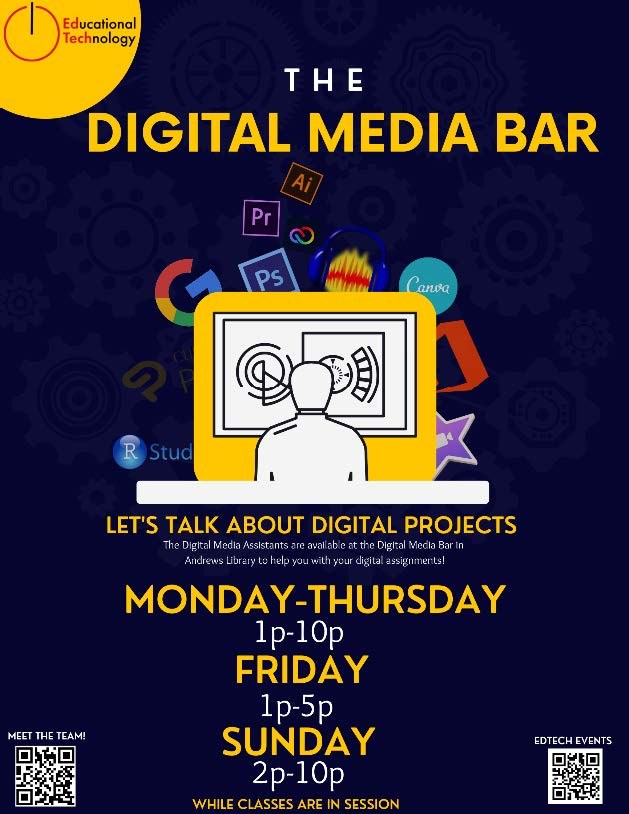
Digital Media Assistants staff the Digital Media Bar in Andrews Library and are responsible for answering basic software questions about Microsoft 365 and Moodle, assist with our equipment housed in CoRE such as our 3D printers, and provide support to students in planning and completing digital media assignments such as podcasts, videos, and posters. Students also help perform basic troubleshooting in the Digital Studio when necessary.
- Digital Media Assistants are available at the Digital Media Bar (DMB) Sunday – Thursday from 1 – 10 p.m. and Friday 1 – 5 p.m. when classes are in session or via a Teams meeting.
- You can schedule an appointment using Bookings with them to meet at the DMB or in Teams.
Academic Planning
Do you want to talk with someone about your course selection, potential majors, or your educational goals? Would you like help with developing personalized strategies for enhancing your academic learning? Stop by the front desk in APEX or click on a link below to schedule an appointment with one of our APEX Advisors. And remember, drop in appointments are available during Walk-in-Wednesdays 1:30 – 4:00.
Use these links to schedule a meeting with Krista Martin or to schedule a meeting with Dr. Mark Graham.
Learning Accommodations
The Academic Resource Center (ARC) works to ensure that students with disabilities have access equal to that of other students across their collegiate experience. Toward this mission, we provide individual accommodations and services that are designed to build an accessible and inclusive campus community. In conjunction with Disability Support Services, the ARC staff supports all students in developing academic skills, learning about campus resources, and empowering students with ownership as they navigate their collegiate education. If you have inquiries regarding Disability Support Services, consult the Disability Support Services page of the ARC website for more information.
Peer Tutors
Peer Tutors can help you achieve your academic goals in a specific class. Peer Tutors can help you understand assignments, explain the key concepts of course materials, offer feedback and encouragement, and share appropriate resources. Tutoring sessions are individual, weekly, and one-hour long.
Peer Tutors have excelled in their coursework, been nominated by their professors, and have been trained through the Academic Resource Center’s Peer Tutor curriculum.

Other School Policies
Academic Honesty and the Code of Academic Integrity
The academic program at the College seeks to promote the intellectual development of each student and the realization of that individual’s potential for creative thinking, learning, and understanding. In achieving this, each student must learn to act rigorously, independently, and imaginatively.
The College’s understanding and expectations in regard to issues of academic honesty are fully articulated in the Code of Academic Integrity as published in The Scot’s Key and form an essential part of the implicit contract between the student and the College. The Code provides framework at Wooster to help students develop and exhibit honesty in their academic work. You are expected to know and abide by these rules.
Dishonesty in any of your academic work is a serious breach of the Code of Academic Integrity and is grounds for serious penalties. Such violations include turning in another person’s work as your own, copying from any source without proper citation, violating expectations for a group project, submitting an assignment produced for a course to a second course without the authorization of all the instructors, and dishonesty in connection with your academic work. You will be held responsible for your actions. Particular attention should be directed to the appropriate use of materials available online. Whether intentional or not, improper use of materials is a violation of academic honesty. If you are unsure as to what is permissible, please contact your course instructor.
Conflicts with Academic Responsibilities
The College of Wooster is an academic institution, and its fundamental purpose is to stimulate its students to reach the highest standard of intellectual achievement. As an academic institution with this purpose, the College expects students to give the highest priority to their academic responsibilities. When conflicts arise between academic commitments and complementary programs (including athletic, cultural, educational, and volunteer activities), students, faculty, staff, and administrators all share the responsibility of minimizing and resolving them.
As a student you have the responsibility to inform the faculty member of potential conflicts as soon as you are aware of them, and to discuss and work with the faculty member to identify alternative ways to fulfill your academic commitments without sacrificing the academic integrity and rigor of the course.

Discriminatory or Bias Reporting
Contact: Visit the Bias Reporting website
The College of Wooster is committed to promoting its mission of inclusivity and equity in all aspects of the educational enterprise. This commitment extends to all rights, privileges, programs and activities, including housing, employment, admissions, financial assistance, and educational and athletic programs at the College. The College’s Bias Incident Reporting Process is designed to effectively respond to bias concerns raised by faculty, students, staff, alumni and visitors to the College. If you or someone you know are the victims of bias, you can:
- File a report online (where you may choose to identify yourself or not)
- Contact Campus Safety: 2590 (from campus phone) or 330-263-2590
- Call the Anonymous Tip Line: 2337 (from campus phone) or 330-263-2337
- Contact the Dean of Students Office: 2545 (from a campus phone) or 330-263-2545
- Contact the Vice President for Equity, Inclusion, and Diversity Cheryl Nuñez at 330-263-2356
Title IX Reporting
Contact: Joe Hall, jhall@wooster.edu, Title IX website
The College of Wooster is committed to fostering a campus community based on respect and nonviolence. To this end, we recognize that all Wooster community members are responsible for ensuring that our community is free from discrimination, gender bias, sexual harassment, and sexual assault. In accordance with Title IX, Wooster is legally obligated to provide supportive options for all reports of sexual harassment and sexual assault that occur on our campus. Faculty who become aware of an incident of sexual violence, including harassment, rape, sexual assault, relationship violence, or stalking, are mandated reporters at the College and are required to notify Wooster’s Title IX Coordinator. The purpose of this disclosure is to ensure that students are made aware of their reporting options and resources for support. For more information about your rights and reporting options at Wooster, including confidential and anonymous reporting options, please visit here.
Course Withdrawal Options
Students may withdraw from a course after the 6th-week drop deadline until the last day of classes (Tuesday, May 9, 2023 in Spring 2023). Students may withdraw from one course, up to 1.25 credits, at any time through the last day of classes, as long as their total remaining credits are 3.0 or above. This may be done without documentation of extenuating circumstances. Requests to drop enrollment below 3.0 credits will require additional documentation through a Petition for an Exception to an Academic Policy.
Note that because federal government guidelines define courses as ‘attempted’ after 6 weeks, if a student withdraws from a course after 6 weeks, it will be noted as a ‘W’ on their transcript.
Final Examinations
No final examinations are to be given during the last week of classes or on reading days. Students who wish to reschedule a final exam must submit a petition to the Dean for Curriculum and Academic Engagement in advance of the examination. The student must confer with the instructor before submitting a petition, and the instructor should indicate to the Dean if they support the petition. Normally, such petitions are granted only for health reasons. If other reasons necessitate a request for a change in a final exam, the request must be submitted three weeks in advance of the examination. Find electronic petition forms on the Registrar’s website.
